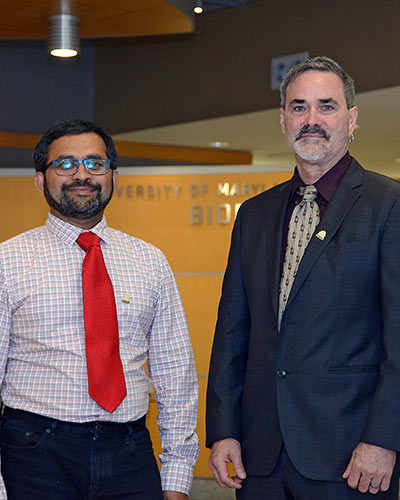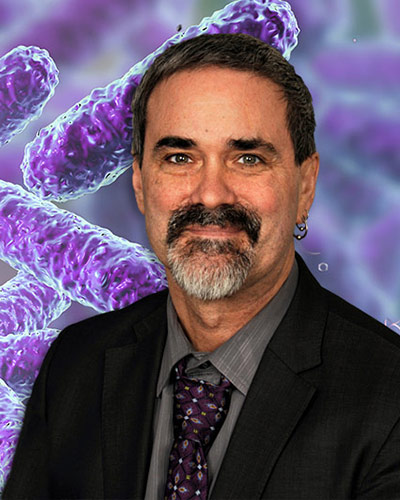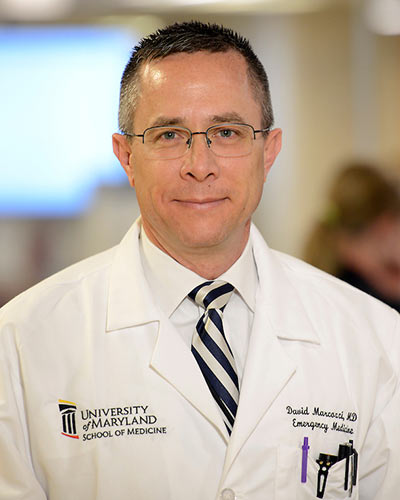September 29, 2017 | David Kohn

Study Triples the Amount of Data on the Human Microbiome
A new study of the human microbiome—the trillions of microbial organisms that live on and within our bodies—has uncovered millions of previously unknown genes from microbial communities in the human gut, skin, mouth, and vaginal microbiome, allowing for new insights into the role these microbes play in human health and disease.
The study, from researchers at the University of Maryland School of Medicine (UM SOM), Harvard T.H. Chan School of Public Health, the Broad Institute of MIT and Harvard, and the University of California San Diego, triples the amount of data previously analyzed in this project, and is the largest human microbiome study ever.
This work appears in the latest issue of the journal Nature.
The results are a significant jump in the amount of information available to scientists. This publication provides new insight into the changes in our microbiome over time and could lead to a greater understanding of the genetic differences that are unique to an individual’s microbes.
“This new data really expands our appreciation for the fingerprint created by microorganisms that make up each human’s microbiome,” says Owen White, PhD, professor of epidemiology and public health and associate director at the Institute for Genome Sciences (IGS) at UM SOM. “These organisms play a crucial role in many key aspects of our health. The more we know about them and their role, the more likely it is that we will be able to manipulate them to improve our health.”
This study is part of the National Institutes of Health Human Microbiome Project, launched in 2008 to identify and characterize human microbes, explore microbes’ relationship to health and disease, and develop computational tools to analyze the microbes. The microbiome has been linked to various aspects of human health including the robustness of our immune system and our susceptibility to chronic illnesses such as Crohn’s disease and cancer.
This work is a continuation of work published in Nature in 2012. In the new study, the researchers analyzed an additional 1,635 new microbiome samples, for a total of 2,355 sampled from 265 people over time. The scientists used DNA sequence analysis tools to identify which organisms are present in various body sites, determine whether they change or stay relatively stable over time, and explore their function. This study also provides one of the largest profiles of non-bacterial members — viruses and fungi — of the microbiome. In addition, it unraveled some of the biochemical activity that allows microbes to play a role in human health.
Although the new study illuminates a great deal about the microbiome, an enormous amount remains unknown. Learning more about it will take time, said Anup Mahurkar, the executive director of software engineering & information technology at IGS. “These communities of organisms are tremendously complex. In one sense, this study is a great advancement for the research community,” he said. Mahurkar was responsible for the months of intensive computations required to process the data. However, he was also cautious, saying “On the other hand, it still just moves the needle. There will always be more we can learn.” Mahurkar is confident that the work will provide a large data resource for other scientists to use in their future research.
Support for the study came from National Institutes of Health and the Crohn's & Colitis Foundation of America.
“The microbiome is one of the great undiscovered areas in medicine today, with links to many common and problematic chronic diseases,” said UM SOM Dean E. Albert Reece, MD, PhD, MBA, who is also the vice president for Medical Affairs, University of Maryland, and the John Z. and Akiko K. Bowers Distinguished Professor. “This pathbreaking research will open the door for a wide range of clinically relevant research in the years to come.”
About the University of Maryland School of Medicine
Commemorating its 210th Anniversary, the University of Maryland School of Medicine was chartered in 1807 as the first public medical school in the United States. It continues today as one of the fastest growing, top-tier biomedical research enterprises in the world -- with 43 academic departments, centers, institutes, and programs; and a faculty of more than 3,000 physicians, scientists, and allied health professionals, including members of the National Academies of Science, Engineering and Medicine, and a distinguished recipient of the Albert E. Lasker Award in Medical Research. With an operating budget of more than $1 billion, the School of Medicine works closely in partnership with the University of Maryland Medical Center and Medical System to provide research-intensive, academic and clinically-based care for more than 1.2 million patients each year. The School has over 2,500 students, residents, and fellows, and nearly $450 million in extramural funding, with more than half of its academic departments ranked in the top 20 among all public medical schools in the nation in research funding. As one of the seven professional schools that make up the University of Maryland, Baltimore campus, the School of Medicine has nearly 7,000 total employees. The combined School and Medical System (“University of Maryland Medicine”) has a total budget of $5 billion and an economic impact of nearly $15 billion on the state and local community. The School of Medicine faculty, which ranks as the 8th-highest public medical school in research productivity, is an innovator in translational medicine with 600 active patents and 24 start-up companies. The School works locally, nationally, and globally, with research and treatment facilities in 36 countries around the world. Visit medschool.umaryland.edu/
Learn More
• Department of Epidemiology and Public Health
• Institute for Genome Sciences
Contact
Department of Anesthesiology
(410) 328-6120 (phone)
(410) 328-5531 (fax)
swalsh@som.umaryland.edu
University of Maryland School of Medicine
David Kohn
Director of Medicine and Science Communications
University of Maryland School of Medicine
Office of Public Affairs
dkohn@som.umaryland.edu
(410) 706-7590
Related stories

Monday, July 14, 2025
UM School of Medicine Team Wins NIH TARGETED Challenge with Brain Genome Editing Technology
A team of researchers from the University of Maryland School of Medicine (UMSOM) recently won a $250,000 prize from the National Institutes of Health (NIH) to improve technologies for delivering genome editing tools to targeted cells in the body. They were one of four winners in a competition after successfully demonstrating a new technique to deliver genome editing biotechnology across the blood-brain barrier to brain cells in preclinical models.

Tuesday, September 14, 2021
University of Maryland Medicine Partners with Vibrent Health to Embark on Landmark Precision Health Research Study
University of Maryland Medicine announced a new partnership today with Vibrent Health, a health technology company based in Fairfax, Virginia, to create the All of Maryland Precision Health Initiative, a statewide digital platform for studies examining how genes and other factors affect health. The mission of All of Maryland -- a study that will be led by University of Maryland School of Medicine (UMSOM) researchers -- is to discover better ways to individualize healthcare. The goal is to enable individuals to benefit from treatments tailored to their own health profiles.

Wednesday, June 16, 2021
UM School of Medicine Researchers Awarded $5 Million NIH Grant to Improve Use of Genetic Risk Scores in Diverse Populations
Researchers at the University of Maryland School of Medicine (UMSOM) have received a $5 million federal grant to pool genomic information from existing and new datasets – predominantly in African and African American populations -- in order to calculate the risk of developing specific diseases. They will use sophisticated modeling and genetic datasets to calculate the risk, known as a polygenic risk score, with an emphasis on studying people from different ancestries.

Wednesday, May 29, 2019
The Human Microbiome Project expands the toolbox for studying host and microbiome interactions
New studies provide a framework for future studies of the role of the microbiome in health and disease.

Thursday, September 27, 2018
University of Maryland School of Medicine Scientist Receives Prestigious Microbiome Award
Owen White, PhD, professor of epidemiology and public health, and Associate Director for Informatics at the Institute for Genome Sciences (IGS) at the University of Maryland School of Medicine (UMSOM), has received the 2018 Microbiome Pioneer Award. The prestigious honor is part of the Bioinformatics for the Microbiome Symposium organized by Stanford University. The microbiome is the name given collectively to the community of trillions of microbial organisms that live on and within our bodies.

Tuesday, June 27, 2017
University of Maryland School of Medicine Names David Marcozzi to Help Lead Health Disparities and Population Health Program
Jay S. Magaziner, PhD, MS, Hyg, professor and chair of the Department of Epidemiology and Public Health (EPH) at the University of Maryland School of Medicine (UM SOM), along with UM SOM Dean E. Albert Reece, MD, PhD, MBA, announced today that David Marcozzi, MD, MHS-CL, FACEP, an associate professor in the UM SOM Department of Emergency Medicine, has been named as Co-Director of the UM SOM Program in Health Disparities and Population Health, which is based in EPH.

Wednesday, May 31, 2017
When It Comes to Health, Does Zip Code Matter More than Genetic Code?
A range of powerful evidence shows unequivocally that where you live, as well as your social circumstances, play a huge role in your health. This was the message delivered by Anthony B. Iton, MD, JD, MPH, Senior Vice President of Healthy Communities at the California Endowment, in a lecture April 18 at the University of Maryland School of Medicine (UM SOM).

Tuesday, April 04, 2017
University of Maryland School of Medicine Physician Scientist Receives Top Award in Epidemiology from Physician's Group
Mary-Claire Roghmann, MD, MS, Professor of Epidemiology and Public Health, and Associate Dean for Physician Scientist Training and Transdisciplinary Research Advancement, at the University of Maryland School of Medicine (UM SOM), as well an Associate Hospital Epidemiologist and Investigator at the VA Maryland Health Care System, has been awarded the Alvan R. Feinstein Memorial Award from the American College of Physicians (ACP). The award was presented in San Diego at ACP’s Convocation Ceremony on March 30, 2017, during its annual scientific conference, Internal Medicine Meeting 2017.

Friday, May 13, 2016
UM SOM Researchers Demonstrate Link Between "Jumping Gene" and Colon Cancer
Roving DNA Strands Could Play Key Role in Some Colon Tumors, Perhaps Other Tumors Too. For more than 50 years, scientists have known of the existence of "jumping genes," strands of DNA material that can move from one location in the genome to another.
